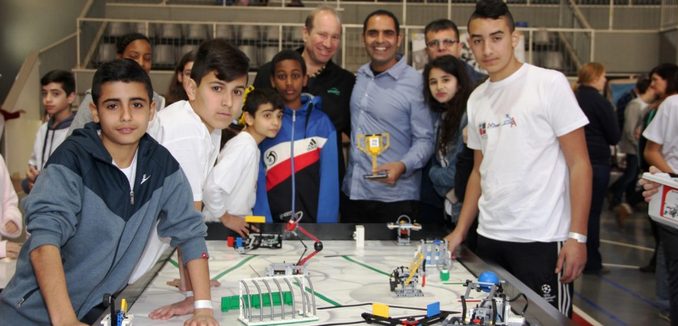For a few hours each week, more than 2,000 fourth- to ninth-graders from 31 Jerusalem schools transform into PICO Kids.
Mentored by 80-plus university students and local entrepreneurs, PICO Kids might build mini rockets, produce maps of their own DNA, create TED-style talks, do lab experiments, and learn programming, 3D printing and robotics to help solve real problems.
“Creativity peaks at a young age and we are focused on developing the tools to help the kids leverage their creativity to arrive at breakthrough ideas,” says philanthropist, investor and serial entrepreneur Elie Wurtman.
Wurtman piloted PICO Kids in 2012, with 12 middle-schoolers from two schools, to fulfill his “action pledge” as an Aspen Institute Global Leadership Fellow and to further advance his home city, Jerusalem.
He and a few silent angels fund the project as a division of his PICO Group (People-Ideas-Community-Opportunities) of creative and entrepreneurial enterprises.
“I’m an entrepreneur with the ability to dream and think big, but we started out small like any good venture,” Wurtman tells ISRAEL21c. “Today PICO Kids is one of the most meaningful educational programs in Jerusalem in terms of impact and scale. Our robotics program is now the largest of its kind in the country.”
Schoolteacher Erez Nachmanson helped develop PICO Kids and heads its robotics program.
“When I started there were 10 or 12 schools involved and this year we have 90 groups,” Nachmanson tells ISRAEL21c. “Elie and I saw there is a triangle of money, mentors and kids, and the part that was missing was either money or mentors. Getting kids was never a problem.”
Nachmanson formed a few gender-specific robotics groups because of research showing that girls, in particular, achieve better that way. This approach has borne fruit especially for girls’ teams from one underprivileged school that have taken top honors in regional and national competitions.
“The impact is on the girls, their school and the entire community,” says Wurtman.
However, while nonprofit initiatives such as JVP Community and The Equalizer run afterschool enrichment, sports, leadership or volunteerism programs for weaker populations in Jerusalem, PICO Kids touches all demographic groups.
“The language of STEEM [science, technology, engineering, entrepreneurship and math] is the ultimate equalizer for all the diverse communities of Jerusalem,” says Wurtman. “Schools from privileged and underprivileged communities are participating on equal footing and all are doing very well.”
At its core, PICO Kids is not about medals but about real-world impact.
The program includes makeathons and hackathons with practical goals, such as designing 3D-printed assistive aids for local kids with disabilities or using technology to enhance the visitor experience at Jerusalem museums.
“This year we’re doing a water-themed hackathon with the Jerusalem Botanical Gardens to see what challenges exist that we can apply children’s creative thinking to solve,” says Wurtman. “The kids understand that they can come up with solutions which are on par, if not better than, adults’ solutions.”
One PICO Kids makeathon group created a 3D-printed music box with an internal xylophone operated by hand pedals. The ALYN rehab hospital for children in Jerusalem is further developing this invention at its Innovation Center.
Wurtman relates hearing a PICO Kid mention the ALYN makeathon in his bar mitzvah speech as the most meaningful experience of his life so far.
Caroline Shapiro, mother of past PICO Kids participants Nadav, 16, and Eliora, 14, says the program is “education at its best for science and technology. It opened up their horizons and challenged them to think about new topics in different ways. Especially for my daughter and other girls, it is important to know that science is accessible for them.”
Last year, PICO Kids helped launch QueenB to teach coding skills to female students working with female mentors. The program won $72,000 in the recent Tel Aviv WeWork Creator Awards.
This year, 27 schoolteachers are participating in weekly tech and design thinking exercises at the PICO co-working space in Jerusalem as Wurtman begins moving the program from outside to inside the school system.
“We’re at the stage where we’re increasing partnerships and working with other organizations as well as the city,” he says. “To be sustainable we need public-private partnerships.”
It’s not surprising that Wurtman has gotten inquiries about PICO Kids from other Israeli municipalities, but he’s also fielded requests from groups in Hong Kong, China, Kenya and the United States. While he doesn’t rule out expansion, for now he’s keeping it local.
“As a social-impact philanthropist, I am extremely focused on Jerusalem and I have more work to do here to continue to improve what I believe is the center of Israel and the source of inspiration for the world,” Wurtman says.
He points out that although Tel Aviv is considered the heart of the startup nation ecosystem, Jerusalemites founded and played a key role in blockbuster Israeli companies including Waze, Check Point, ironSource and Mobileye.
“We’ve wrapped around these core values, focused on using technology to make the world a better place, first and foremost for these kids by giving them future-facing skills. It’s what we need to do for Jerusalem, Israel and probably for the world, to solve bigger and bigger issues,” he says.
(via Israel21c)
[Photo: Israel21c]




